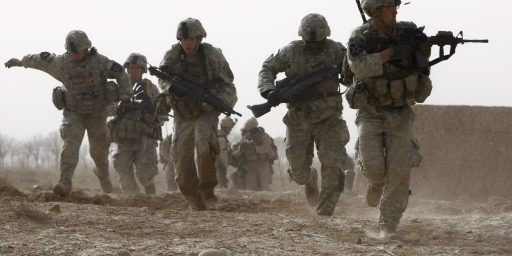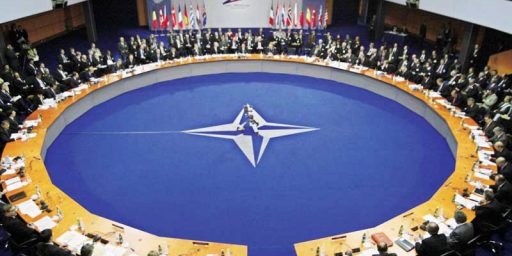NATO Steps Up Afghanistan Commitment
While neither Afghanistan nor NATO are getting much attention these days, the alliance decided yesterday to increase the number of troops in Aghanistan from 9,700 to 16,000. This is in addition to a 20,000 man strong U.S. force under separate command near the Pakistan border.
NYT and LAT have detailed stories.
While this re-commitment is not entirely a slam dunk, since the introduction of forces begets violence in addition to combating it. Increasingly, too, the war on terrorism is intersecting with the war on drugs, as the latter is financing* the former. Peter Spiegel:
NATO military officials have questioned whether the upsurge in violence is solely due to a return of Taliban- and Al Qaeda-linked forces in the south. Some of the most high-profile violence has occurred in Helmand province, one of Afghanistan’s prime poppy-growing regions, and commanders have said some of the attacks may be related to drug trafficking.
But officers also acknowledge that the introduction of NATO forces for the first time in the south, which will double the number of coalition soldiers in the region, and Afghanistan’s annual spring fighting season are primary factors in stirring anti-coalition activity. Military officials estimate that about 600 fighters are in Helmand, nearly double the figure of six months ago.
“This is now the season that the Taliban get more active, and then it will die down again,” Rumsfeld said.
U.S. Marine Gen. James L. Jones, the alliance’s supreme military commander, said in a recent interview that Taliban-linked forces also might be trying to influence NATO’s European members. The British-led deployment to the south, which is largely made up of British, Canadian and Dutch forces, has been controversial in Europe. “There have been some countries in NATO, in the political decision-making process over whether to join the mission expansion or not, that have had pretty public debate, particularly in Holland,” Jones said. “If I were a member of opposing military forces, I probably would have said: ‘Hey, I’m kind of encouraged by this. Maybe if we get in there and we raise all kinds of difficulties we might be able to seed some dissension within the alliance, and some nervousness in capitals.’ “
Such is the nature of assymetric warfare. Still, unlike Iraq, virtually all agree that winning here is crucial to the defeating the jihadis.
*Yes, I know this is largely a function if the illegality of drugs and the resulting incentives for organized crime.





